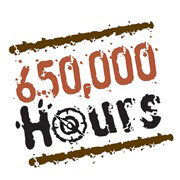Jane Karigo says that God told her to create an orphanage in her native Kenya. But what if God was wrong? That was the premise of my recent feature for The Washington Post Magazine on the indomitable Jane, the Calvary Zion Children’s Home, and the complexities of supporting of an orphanage. I returned to the home in December 2018 and I eventually realized: Jane doesn’t see Calvary Zion as an orphanage. She sees it as her family. Sure, it’s a huge family (with 41 kids), but it’s a family nonetheless.
Susan and I escaping the Kenyan sun at Calvary Zion’s 20th anniversary party in 2018.
One prominent member of Calvary Zion’s now-global family is Susan Peattie of Scotland. In 2005, Susan traveled to Kenya, and some friends back home gave her money to donate to a good cause. Through serendipity (or God’s will, according to Jane), she happened upon Calvary Zion—and the home was struggling. She soon created the Calvary Zion Children’s Home Support Trust, which raises money and finds sponsors for the kids.
Susan is a funny, fascinating, globe-trotting woman: She worked in Kazakhstan for two years as a kindergarten teacher and has taught English in the Czech Republic, Spain, Guatemala, and now, for a second time, in Japan. I asked Susan to discuss her support for Calvary Zion and what she’s learned as an international traveler.
What do you like best about living abroad?
I see things from a non-tourist perspective. I’ve been whipped with willow branches in the Czech Republic at Easter to bring me good luck for the year and helped children make kites for Day of the Dead in Guatemala. Nowadays, apps and websites make it easy to meet up with people and do stuff, and my adult students are often keen to show me around or have me for dinner. Routine things are quite different. In Japan, getting my hair cut is a real pampering session with complementary head/neck/shoulder massage, time on a heated massage chair, green tea, and a free gift.
What has been most rewarding about your work with Calvary Zion?
That`s easy! Seeing the children grow up and become young adults living independent lives because they’ve had the opportunity to finish school, which increases their chances of employment significantly. I am proud to be a part of that.
What is most challenging?
It is a constant struggle to pay school fees and keep all of the children in school. But our sponsors and supporters have been so loyal over the years, and the schools are usually very patient when we have outstanding debts.
What is your favorite success story?
When I was visiting the home one time, some of the girls had the opportunity to perform with the school choir in a competition north of Nairobi. Jane was not happy about them going so far away without her, so they asked if I would speak to her. She finally agreed at the eleventh hour. Not only did they have a great time, but they won the competition, performed for the Kenyan President, and met him afterwards.
What has been your hardest moment?
When the home was attacked by armed men. I heard the news when I was working in the Czech Republic and it was hard being so far away. I hardly slept for several nights. But Jane is strong and she sent me reassuring messages that they were ok. We were inundated with offers of support and one of our supporters, Carly Humphreys, helped raise funds for a security system. There was another attempted attack, but this time the panic alarm sent them running.
What do you like about teaching abroad?
Susan enjoys a sports day with students in Guatemala.
I meet so many interesting people and I have so much variety in terms of ages and levels of students. I also like that I can pick and choose when and where I want to work. A variety of contracts are available, anything from three months to a year, and work is pretty much available everywhere across the world. It gives me freedom and that suits me: I get bored quite easily!
What is the biggest lesson you’ve learned from traveling?
I’ve traveled to about 35 countries and now I have the confidence to travel alone. You interact more with local people when you travel alone because you want human contact. In Morocco, I made eye contact with a group of ladies in a cafe, said hello, and was invited to their table. We chatted for hours. They just wanted to interact and be friendly: They could see I was on my own. We live in a bad world in many ways, but I’ve learned there are definitely more good people than bad.
Want to sponsor a child at Calvary Zion? Visit the trust’s web site.
Ken Budd is the author of The Voluntourist and the host of 650,000 Hours. Sign up here for the monthly 650,000 Hours newsletter!


